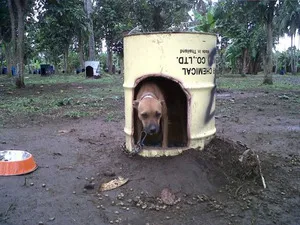More than 300 Pit Bull Terriers were rescued in the Philippines last Friday in what some are calling the world’s largest dog fighting raid.

The Philippine Animal Welfare Society (PAWS) and the Philippine police coordinated the effort, which included a two-week surveillance period prior to the raid. The Pit Bulls were found on a five-acre site in San Pablo, just south of the capitol city of Manila.
A South Korean dog-fighting syndicate is responsible. Investigations indicate the same group of offenders had recently been released on bail after a similar incident in neighboring Cavite province; as many as 256 dogs were rescued in the Cavite raid last December.
“This appears to be a large operation and these South Koreans need to be punished,” stated PAWS Program Director Anna Cabrera.
The dogs were found in very poor condition, many of them emaciated and suffering from bite wounds to the head and face. Many of the dogs were reported to have ripped ears and tongues, injuries incurred as a result of dog fighting. Each dog was tethered with heavy chains, having only makeshift kennels made from steel drums to serve as meager shelter from the elements.
At least 20 of the dogs were discovered to be in such bad shape that they had to be euthanized on site. The rest of the dogs are now in the hands of PAWS, who is currently in the process of finding temporary shelter for the rescued Pit Bulls. “The government simply does not have a facility big enough to hold these animals,” Cabrera said.
Chief Inspector Renate Galang of the Police Criminal Investigation and Detection Group (CIDG) explained that the dogfights were filmed and broadcast as part of an online gambling operation.
“This was a major online gambling syndicate in which they cruelly pitted the dogs against each other, sometimes to the death,” the Chief Inspector said.
Cabrera and the entire PAWS organization argue that animal cruelty and anti-dog fighting laws in the Philippines aren’t harsh enough. “Too many animals have already suffered, and criminals are becoming bolder, taking only two months after arrest to get back into their illegal operations once they have posted bail,” they said, urging the government to consider stricter animal cruelty laws.
Currently, those convicted of animal cruelty under the Philippine Animal Welfare Act of 1998 face a penalty of six months to two years of prison time or a maximum fine of 5,000 pesos (the equivalent of $116 U.S.). Often, however, the offender is released after posting bail.









